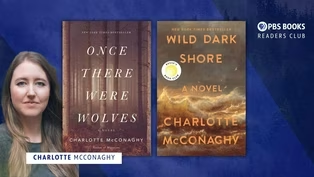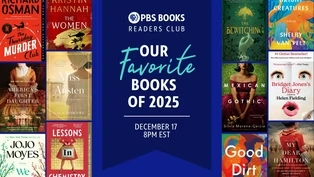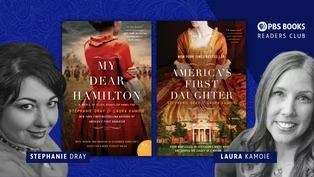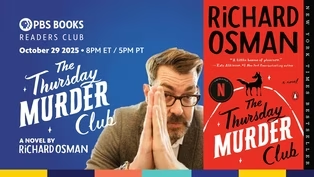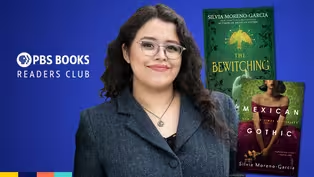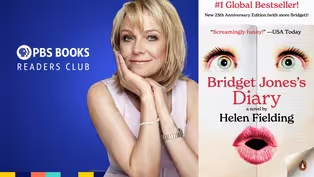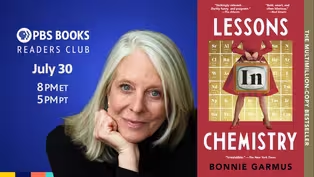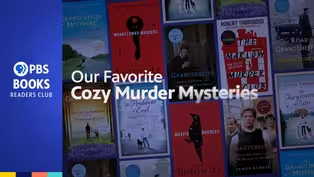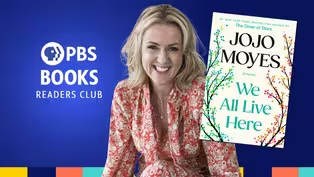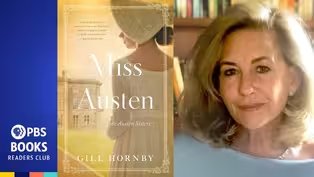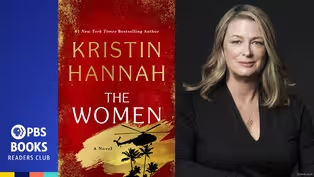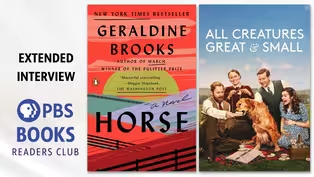
Readers Club | Horse and All Creatures Great & Small
Season 2024 Episode 37 | 40m 34sVideo has Closed Captions
Our hosts interview author Geraldine Brooks and filmmaker Jamie Crichton.
Join the PBS Books Readers Club hosts as they sit down with Pulitzer Prize-winning writer Geraldine Brooks to discuss her bestselling novel "HORSE". Learn about her process when writing this novel and her life off the pages. And don't miss an inside look on what’s in store for our beloved characters of All Creatures Great and Small season 4 with the Executive Producer, Jamie Crichton.
Problems playing video? | Closed Captioning Feedback
Problems playing video? | Closed Captioning Feedback

Readers Club | Horse and All Creatures Great & Small
Season 2024 Episode 37 | 40m 34sVideo has Closed Captions
Join the PBS Books Readers Club hosts as they sit down with Pulitzer Prize-winning writer Geraldine Brooks to discuss her bestselling novel "HORSE". Learn about her process when writing this novel and her life off the pages. And don't miss an inside look on what’s in store for our beloved characters of All Creatures Great and Small season 4 with the Executive Producer, Jamie Crichton.
Problems playing video? | Closed Captioning Feedback
How to Watch PBS Books
PBS Books is available to stream on pbs.org and the free PBS App, available on iPhone, Apple TV, Android TV, Android smartphones, Amazon Fire TV, Amazon Fire Tablet, Roku, Samsung Smart TV, and Vizio.
Providing Support for PBS.org
Learn Moreabout PBS online sponsorshipMore from This Collection
The PBS Books Readers Club is a monthly digital-first series that brings its members into conversations behind the stories of your favorite books & shows. You can watch the online on the PBS App, with extended interviews available for PBS members on PBS Passport.
Readers Club | 302 Book Picks for Black History Month with Lauren Smith and Princess Weekes
Video has Closed Captions
PBBS Books Readers Club recommend their favorite Black History Month reads. (16m 16s)
Readers Club | Ep 301: Charlotte McConaghy | Once There Were Wolves
Video has Closed Captions
PBS Books Readers Club hosts author Charlotte McConaghy to discuss her novel Once There Were Wolves. (58m 55s)
Readers Club | Ep. 212: Our Favorite Books of 2025
Video has Closed Captions
PBS Books Readers Club celebrates the wrap of its second season with a highlight of 2025 (47m 55s)
Readers Club | Ep. 211: America's First Daughter | Stephanie Dray & Laura Kamoie
Video has Closed Captions
PBS Books Readers Club welcomes co-authors Stephanie Dray and Laura Kamoie (1h 1m 45s)
Wed Oct 29 2025 | Readers Club | Ep. 210: Richard Osman | Thursday Murder Club
Video has Closed Captions
PBS Books Readers Club welcomes celebrity writer Richard Osman to discuss his best-selling novel (52m 44s)
Readers Club | Ep. 209: Silvia Moreno-Garcia | The Bewitching and Mexican Gothic
Video has Closed Captions
PBS Books Readers Club welcomes award winning author Silvia Moreno-Garcia to discuss her new book. (52m 42s)
Readers Club | Ep. 208: Helen Fielding | Bridget Jones's Diary
Video has Closed Captions
PBS Books Readers Club welcomes beloved British author Helen Fielding to discuss her iconic novel (59m 30s)
Readers Club | Ep. 207: Lessons in Chemistry | Bonnie Garmus
Video has Closed Captions
PBS Books Readers Club welcomes international best-selling author Bonnie Garmus to discuss her novel (49m 3s)
Readers Club | Ep. 206: Our Favorite Cozy Murder Mysteries
Video has Closed Captions
PBS Books Readers Club hosts a special event sharing Our Favorite Cozy Murder Mysteries (52m 32s)
Readers Club | Ep. 205: We All Live Here | Jojo Moyes
Video has Closed Captions
PBS Books Readers Club welcomes international & New York Times best-selling author Jojo Moyes (57m 37s)
Readers Club | Ep. 204: Miss Austen | Gill Hornby
Video has Closed Captions
PBS Books Readers Club welcomes international best-selling author Gill Hornby to discuss her novel (51m 18s)
Readers Club | Ep. 203: The Women by Kristin Hannah
Video has Closed Captions
PBS Books Readers Club welcomes international best-selling author, Kristin Hannah to discuss novel. (53m 29s)
Providing Support for PBS.org
Learn Moreabout PBS online sponsorship- It doesn't matter if you've got a great animal story unless it speaks to whatever human story you are telling.
- I realized it couldn't just be a story about racing.
It would also have to be a story about race in America because of the signal contribution of the skilled Black horsemen on whose plundered labor and skills this racing industry had been built.
(bright orchestral music) - Well, hi, and welcome to the "PBS Books Readers Club."
- Today we'll meet Pulitzer Prize winning author, Geraldine Brooks, and Jamie Crichton, the new head writer of the hit PBS series, "All Creatures Great and Small," which of course is based on the beloved book series by James Herriot.
- Yeah, and we are also going to reveal our pick for next month's read.
So stick around for all of that.
Hi, I'm Fred Nahhat here with Lauren Smith.
And now let's meet the rest of the "PBS Books Readers Club" crew.
Heather-Marie Montilla is a librarian and our national director of PBS Books and Princess Weekes is a writer and editor with a master's degree in English with a focus on literary theory.
- And hey, you are a part of this, too.
We hope that you will read along with us and join the "PBS Books Readers Club" Facebook group to contribute your own thoughts and ideas.
Seriously, write a comment, a question, let us know where we're getting things wrong.
It happens a lot, every now and then.
So we want you to join us and this is gonna be so fun.
I can't wait for the year ahead.
So many new books, so many new authors to talk to.
We're gonna have a great time.
- It's gonna be so much fun.
I love that we're together.
I love book clubs and you are three of my favorite people and I'm so excited to be here.
- I feel the same about you.
- That's that's brand news, but I'm so excited to have it.
This is gonna be so much fun.
I'm so excited about this book club.
- Well, our "PBS Books Readers Club" feature of the month is "Horse."
We're all very excited to talk about this amazing work with Geraldine Brooks coming up.
But first, Princess, just give us the cliff notes.
What is "Horse" all about?
- So "Horse" is a really engaging book about (indistinct) horse, which is based on the thoroughbred Lexington, which was a dominant horse in its field in the period that we're discussing and how the horse impacts the life of several characters over multiple different decades.
And the way that Brooks weaves it all together touches on so many issues of race and class and even gender is just so rich and engrossing.
I really enjoyed this.
It's an excellent historical fiction.
- I love historical fiction.
I think you guys probably know that.
And this goes beyond the typical historical fiction.
So yes, of course you have Lexington, you have the triumphs and tragedies of Lexington, but you also, as the reader, you are really faced with the impact of slavery, with where, the reader has to reckon with prejudice, racism, police brutality in so many unexpected ways.
- Absolutely, and I think that the book really does a good job through the character of Jarret to really emphasize the solidarity and isolation that comes with enslavement and how Jarret's really forced, while he may love the horse, to find that be his only connection to humanity and love and affection.
And that was just really rich and engaging.
And you also have, through Theo, a modern day look of how, yes, things have changed, but not as much as you would've hoped.
And so that isolation still continues today.
- That's, I mean, so fascinating to learn, but we learned about a lot of things in this book and I thought it was really fascinating the way that Geraldine Brooks chose to tell the story sort of braided across three time periods.
So interesting.
- Really, really interesting.
So we start in Kentucky in 1850 and you have a young boy who's enslaved, Jarret, who is a horse groom, and he develops this unique relationship with a foal, who becomes the horse.
Well, we know him at first as Darley and then Lexington, right?
Then you have New York, you have 1954, Martha Jackson.
She is this edgy, contemporary gallery owner and she just becomes enthralled with a painting of a horse.
And then bring it to 2019 and you have Jess from the Smithsonian.
She is a scientist.
You have Theo, an art historian who is Nigerian American.
And you have their very complex relationship.
- Messy, messy.
- It's very messy.
- Let's talk about Jess.
Because yeah, it's messy.
- It's so interesting.
They're both outsiders because they're both from outside of America, but they're both like, Jess, she means well, she means so well, but she just fails to really understand Theo's own isolation and his work.
And you see through their relationship the way that things like, how interracial relationships have evolved and they exist, but it doesn't necessarily mean that you're always connecting with each other, and I thought that was just really fascinatingly done.
And I also felt like Theo's work was so interesting because what he does is he restores the context of Black images and classical text, and that's something that we're still seeing being done today.
Just recently the Met restored a painting that erased a little Black boy from it.
- Wow.
- And it's like, it's so relevant, and everything in this book just feels so topical, even though it's dealing with just a near past.
- It's such an amazing book.
I can't wait to talk to Geraldine.
- Well, you don't know what you don't know.
And not only the characters in the book, but as a reader, you get that sinking feeling all the way through.
Plenty to discuss coming up with Geraldine Brooks.
Looking forward to that.
But right now we wanna invite you to join the "PBS Books Readers Club" too.
- That's right, you'll enjoy all kinds of insider information and insights into your favorite books and authors when you subscribe to our e-newsletter by visiting pbsbooks.org/subscribe and follow PBS Books on all the socials.
- We also want you to join the conversation on our special "PBS Books Readers Club" Facebook group.
You can chat with other book lovers about book recommendations, insights, and even submit questions for our authors in advance.
- [Lauren] And of course, you should subscribe to the PBS Books YouTube channel, so you never miss an episode.
And this very special offer for PBS supporters to keep up with your reading this year.
An ebook of "Horse" or any of our PBS Books features for your phone, tablet, or e-reader, along with the PBS Books stickers, which are very fun.
- [Fred] Check out our PBS Books stickers for your phone, your laptop, water bottle, back window of your car.
I wanna see these things- - Everywhere!
- Everywhere.
Just click the link in the description or visit pbsbooks.org/donate to get yours now.
The donations support your local PBS station and you'll also enjoy access to PBS Passport, the members only section on the PBS app where you can stream full seasons of your favorite PBS shows.
- Now our first interview today is with Jamie Crichton, the new head writer of the hit PBS series, "All Creatures Great and Small."
And if you loved exploring the bond between animals and their humans in "Horse," you are going to adore this fabulous PBS series.
- Based on the beloved book series, the show follows James Herriot's adventures as a veterinarian in the 1930s Yorkshire Dales, which is beautiful on screen.
Actor Nicholas Ralph portrays the iconic vet who became renowned for his inspiring, I would say dry sense of humor, his compassion for animals, and love of life.
Season four released January 7th, and you can catch up on all the episodes on PBS Passport.
- And it's based on this series of beloved books by James Herriot and I love them because they're just an elegant time capsule of this period.
And you can just read it with a cup of hot cocoa and just feel totally transported.
It's excellent.
- It's amazing.
- Well, let us now welcome in our guest expert, shall we?
"All Creatures Great and Small" executive producer and head writer Jamie Crichton joins us now.
Jamie, welcome to the "PBS Books Readers Club."
- Thank you very much.
Nice to see you guys.
- We are delighted to have you here.
What an amazing undertaking it must have been to write the fourth season of a show that's been such a big hit.
- I was very pleased to hear it's been a big hit and in many ways it's even more popular over there in the States than it is here.
So it's lovely to hear.
- I'm always saying that the Drovers Arms is a place I would love to hang out in, and narratively, such a wonderful place, stirring in a lot of conflict and a lot of twists and trouble.
How fun is it to create these narrative tales, as I say, soaked in ale?
(Lauren laughs) - Yeah, I mean, we're always trying to get scenes in the Drovers.
In fact, this season, we got the green light to expand our set of the Drovers.
So there is more Drovers than you've ever seen before.
- Right.
- Oh good.
- Yeah.
- That's great news.
We love it here.
I don't know, you're probably used to beautiful scenery over there in England, but we love it here.
- Yeah, it's so cool.
So I guess one of the things that jumps out at me is this conflict built into the books, but also in the television series, the idea of tradition versus progress, between science and these folks that are salt of the earth there in the Yorkshire Dales.
Always a place for built in tension and allegory.
- Yeah, I think so.
I mean, it's a series about the simple things in life, and it's a series about, you know, simple human stories.
Even though we're set against World War II now, obviously, in this season, it's never about the big dramatic events.
It's always, the DNA of the show is about, it's about gentle tension.
It's small moments in people's lives, which matter a great deal to them, even if they don't to the wider world.
So it's about sort of how to tell the bigger stories through these much smaller characters and smaller stories and making us care about the smaller stories through that, yeah.
- Very, very true.
And I feel that found family comes across so much in this, and you talk about the simplicity, yet found family isn't always so simplistic.
Can you discuss some of the interpersonal relationships that you will explore this season?
- Sure, I mean, this season is, yeah, it's slightly different without Tristan, and that makes a big difference to the dynamic.
I mean, from a writer's perspective, we all miss writing Tristan because he's such fun to write.
His kind of impish sense of humor is always, you know, always fun to write.
But actually, there's a strange paradox that it brings out simply by virtue of the fact often of having fewer characters to write in scale Dale.
So there might be, you know, it's amazing that just having that extra space gives your characters just a bit more space to breathe and a bit more opportunity.
And it changes the dynamic as well.
I mean, Tristan not being there, in some ways, it makes James feel like he's reverted to person he was at the beginning of season one, episode one when he was trying to impress Siegfried and there was no buffer between himself and Siegfried, and so I think, in many ways, because that buffer's been removed, there are times in this season where James feels like, "Hang on, have I gone back to being Tristan again?"
- Yeah.
- So true.
- And there's also obviously, that changes Siegfried's dynamic, you know, a lot of his sort of grumpy, cantankerousness, especially at the start of this series, may be attributable to the war or to giving up smoking for Lent.
But we all know it's him missing Tristan, which is something that over the course of the season, he's sort of got to be forced to admit.
- For me, one of the most compelling characters is Siegfried, and I like to watch along as he learns.
And he is not a full generation older than his brother, Tristan, and certainly James.
So to me, you can't always predict this parental response.
You sort of don't know which way he's gonna go and that can result in some wonderful surprises.
- Yeah, he's very unpredictable, which is what makes him fun.
And I think, you know, certainly less emotionally intelligent than, well.
- A little EQ struggles.
- Right.
(group laughs) - The two women especially, I mean, I think Helen and Mrs. Hall are the smartest people in the show, in my mind, you know, and it just so happens that they're both living in an age where, you know, the patriarchy, Siegfried is the man of the house.
But it's always fun to write because we know as writers or certainly from my point of view, that yeah, Mrs. Hall is far smarter, certainly emotionally, than Siegfried will ever be.
But yeah, it's about the little subtle moments, isn't it?
That relationship, there's a sort of remains of the day element to it.
- It's fulfilling and respectful, which is why we want it to be every kind of relationship, I think.
But I think it's so interesting to consider the difference in developing characters and relationships for a novel versus the screen.
So what was your process in pulling those elements that exist in the Herriot books into your storytelling for the series?
- Well, I mean, actually truth be told, the books are so great.
They're so funny and they're so effortless in how they bring humanity into the everyday life of the Yorkshire Dales of 1930s and '40s.
And we're not always completely faithful.
I mean the dog in episode one, Duke, is not such a happy ending in the book, shall we say.
It's pretty bleak.
It's a really sad story in the book.
But we changed, I just said, we can't have the dog die at the end of it.
- No.
- That's the bleakest end of a series opener ever.
It's just not what we wanna see.
So, you know, we do occasionally move away from the books.
- I'm glad you made that choice for the dog's sake.
- For the dog.
- Well there are big changes and new characters coming to the Drovers.
Let's take a quick look at what's happening on season four of "All Creatures Great and Small."
(telephone rings) - Darrowby 2297.
- If it wasn't for the ration box in the Victory Gardens, you'd have no idea there's a war on.
(children cheer) - Oh James, look at their little faces.
It could all be over soon.
- Or it could go on for years.
Siegfried!
- James!
What are you?
- Ladies!
Out of there!
- Mr. Farnon.
- Miss?
- Harbottle.
- Yes, of course.
I'm so sorry.
- What will she do?
- Save us from this paperwork apocalypse, rescue us from our administrative- - Is it really that bad?
- You could use an extra pair of hands.
- But Miss Harbottle's not a vet, and that's what we're missing.
- Where is the boy anyway?
Is he late?
- Mr. Carmody's rather beholden to the train from London.
- Richard Carmody, from London.
He won't last.
- Do you always treat your animals like people?
- Yes, Tricky, I quite agree.
He's not like Uncle Herriot.
- He's still learning.
- How are we supposed to just .
.
.
- Carry on without them?
Haven't a damn clue.
Take comfort in those we do have, I suppose.
There's also whiskey.
- How do I tell her that she'll be all right, when I have no idea if it will be?
- They rely on us to be resilient, don't they?
But it isn't always easy.
- If this war taught us anything, it is to cherish every moment.
(soft bright music) - Well it is a show that comforts us, touches us in so many ways, and that's why we love it.
Jamie Crichton, thanks for joining us on the "PBS Books Readers Club."
We will look forward to "All Creatures Great and Small," all seasons now available on PBS Passport.
Thanks so much, Jamie.
We're grateful for the time.
- Thank you, Jamie.
- You're very welcome.
Take care.
- Wow, some terrific insight into one of our favorite PBS shows.
Exactly, as someone said earlier, what we need right now.
- Oh, great animal stories.
I love that.
- All I can think about now is the little chickens on their mark, and it's like.
(group laughs) And just like- - Professional acting cats.
- I'm just gonna name them all, like, Meryl Streep Chicken, Daniel Day-Lewis Chicken.
Oscar, the Oscar winning cat, so.
- I love that so much.
And now we come to our featured author of the month, the Pulitzer Prize winning author of "Horse," Geraldine Brooks.
- And after that we are going to reveal the "PBS Books Readers Club" selection for next month.
So stick around for that.
But now let us welcome in Geraldine Brooks to the "PBS Books Readers Club."
- Well good day.
It's wonderful to be with you.
- We're so glad to have you here with us, and this book, we all loved reading it.
It was the perfect selection for our first pick of the month and it just felt so big, almost cinematic.
I could sort of see it playing out before my eyes.
Where did this all begin for you and where did the idea come from?
- Well, I have to say it began for me with the rather rash decision to take up horse riding in my 50s having never been horsing.
- Wow!
- But I was at, actually, it was a conference for writers in Santa Fe and it was on a ranch and one of the wranglers persuaded me that they were great horses and nothing terrible would happen to me if I went on a trail ride.
And I believed him and I had an ecstatic experience doing it.
And a few days later when I was back home at my place on Martha's Vineyard, a young friend came over and I told her how much I'd loved it and she looked out the window and she said, "You've got a couple of acres, you could have a horse.
In fact I can give you my horse."
- That's amazing.
- There you go.
- A free horse, you know, well actually, there's no such thing as a free horse.
And it was a very sweet- - So true.
- Upkeep.
- And many, many times during the course of learning about how to care for a horse and how to stay on a horse, I often thought that knitting would've been a more sensible choice.
(group laughs) In any case, I was obsessed with this horse and I wasn't getting any actual fiction writing done 'cause all I wanted to do was read horse books and ride my horse.
And then I was lucky enough to go to a lunch at Plimoth Patuxet Museum.
And at the same lunch, way down the table, a gentleman from the Smithsonian was telling his lunch mates how he had just delivered the skeleton of the greatest racehorse in the American 19th century from a forgotten place in the attic at the Natural History Museum in Washington to pride of place in the International Museum of the Horse in Kentucky, because this horse was the reason that Kentucky became the center of thoroughbred breeding in America.
And my salad was uneaten and my lunch- (group laughs) not a cent of my attention because I knew right away that this was going to be my next novel.
- That's amazing, what an amazing story.
- Right?
Wow.
- That's incredible.
- Life is stranger than fiction.
(group laughs) - Well your book, it truly champions the relationship between a horse and a human.
It's extraordinary to read about Jarret's connection with Darley, who is then renamed Lexington.
Can you speak about this relationship and how much is based on fact versus fiction?
- So we know that Lexington had a Black groom called Jarret.
There are mentions in certain farm records, there's the mention, you know, unfortunately you're talking about the Antebellum period and Jarret was enslaved.
But what it was like to be him, unfortunately, there is no record.
So that's where imagination comes in.
And so I tried to inform that imagination resting very heavily on the work of Black historians and other historians who have started to unearth the enormous contribution of highly skilled Black horsemen to racing in the 19th and early 20th centuries, until Jim Crow laws forced them out of the business for decades.
So Jarret existed.
I tried to create him in the light of the history and also in the light of my own experience with horses.
So everything that Jarret experiences with Lexington, all the feelings and all the observations that he makes, are really about me and my mare.
- [Princess] Absolutely, all those relationships matter.
And I think your book is all about these relationships and bonds.
You told a really big expansive story in "Horse" and over so many different time periods and different sets of characters.
What made you decide to tell this story in that kind of way?
- The story itself told me how it needed to be told.
I didn't expect it to have as many strands.
I thought it was gonna be, really, (laughs) as you always do when you set out on a new novel, it's very clear it's gonna be so much simpler than the last one, and it's never simple.
But immediately I started to research it, I realized it couldn't just be a story about racing.
It would also have to be a story about race in America because of the signal contribution of the skilled Black horsemen, on whose plundered labor and skills this racing industry had been built.
And then, you know, I was interested in the science around the Smithsonian.
How had this horse's skeleton got there?
Why was it neglected in the attic?
So I thought that there would be a contemporary thread to frame the story.
And because I was going to be talking about race in the 19th century, I couldn't leave that thread behind there as if it's something over and done with that we don't have to concern ourselves with anymore.
I knew that that would have to reverberate in the contemporary story as well.
And then much to my astonishment, as I learned of all the wonderful paintings that had been made of Lexington and of the people who worked with him in the 19th century, it led me to the art piece of the story.
And that most unexpectedly led me to New York in the immediate post World War II period when artists were changing our aesthetics and the rise of Jackson Pollock and de Kooning and Bridget Riley and all these marvelous artists who were doing art in a new way.
And who would've thought a 19th century race horse was gonna lead me straight to Jackson Pollock- - It was a surprise for everybody.
It was so interesting.
- All right, Geraldine, I wanna talk about process.
What was it like for you to write three separate but related storylines?
Do you write them all separately or do you go in linear order?
How do you outline something like that?
- So I'm a pretty instinctive writer.
I don't outline a lot because I came to writing fiction from journalism, so I never had any formal MFA classes or anything of that nature, where you learn the toolbox that writers use.
I just took the journalist's toolbox and then allowed something that journalists aren't allowed to do, which is when you run out of fact, as a journalist, you have to stop.
You can only print what you can prove, or at least that's how it used to be.
(group laughs) - Allegedly.
- No, it certainly was during my long career studying in Australia newspapers and then with the Wall Street Journal for 10 years as a foreign correspondent.
But the beauty of being a novelist is you follow the line of fact as far as it leads and you pull on that thread and you pull on that thread and then when that thread frays and breaks and there's no more fact to be found, you get to make it up.
And so that's my process.
My process is to deeply, deeply research, to read as much as I can in the voices of the period until I can hear those voices in my head.
And then when I can't dig up the fact after, you know, the most diligent effort I can make, only then I let myself start to imagine what it might have been like.
- "Horse" tackles some pretty heavy themes, including racism in the past and present.
Can you talk about why you felt like this story was so important to tell?
- Because the people who surrounded the horse, Darley, then Lexington, most of them who were responsible for his early success were Black and enslaved.
So there's no really, no moral way to leave them out of the story.
And I have to say, you know, I was writing this at a time when the argument about appropriation had become very loud and I had some trepidation as a white woman, writing the lives of Black men.
And yet, so, you know, the cowardly way to do it would've been to focus on the white owners, but that would've been to erase the enormous contribution of the Black horseman once again, and I couldn't do that.
So I just had to do the best job I can.
And luckily, you know, with the contemporary thread as well, I had Black friends who were extremely patient and generous with me in laying out aspects of their lived experience.
And in the United States, I live on Martha's Vineyard, which has had a thriving Black community (indistinct).
You are hearing our wonderful Australian cockatoos.
- That's amazing.
- I love it.
It's like great views- - We all love an animal- - Big and small.
- Big, big, animal episode.
- Well that's for sure.
You know, it's also really interesting how the themes of racism are brought forward through the characters.
- Yeah, so many different characters.
You have Mary Barr, and I would love to discuss, I found all your insights really wonderful.
I really appreciate that as a Black reader, I could tell that there was a lot of care taken in it.
And also the white characters that we do have all give insights into the contradictions of whiteness at the time.
So you have Mary Barr, you have Jess.
So I was wondering how are you sculpting the white characters as you are also creating their narrative in this story?
- So, you know, I had so many characters that I had to deeply research.
So I decided to give myself one character that I didn't have to research and she's very much based on me, and that's Jess.
And like Jess, I came to the United States for graduate school, not expecting to stay very long, but I was offered a wonderful job and so way led onto way and I've had a very American life over the past few decades.
But when I arrived as a graduate student, never having lived outside of Australia before, I was very naive and very, you know, I blundered in social situations and I didn't understand a lot of what I was seeing.
I had a steep learning curve.
So I gave all that to Jess.
- Were there parts of that immigrant experience that you also put into Theo?
'Cause I thought it was interesting that you have this discussion of contemporary race through two lenses of people who are navigating it with intensity, but also a level of difference.
So how did Theo's Nigerian American identity form in your mind when you were crafting him?
- So something, you know, someone I'm very lucky to call a friend, Professor Henry Louis Gates, who has a wonderful course at Harvard on Black studies and the first thing he says to his students is there are 20 million ways to be Black in America.
And so I just wanted to complicate the issue a bit by making Theo somebody who has only lived in America for a short time.
He is the son of diplomats, a Black American father and a Nigerian mother, and he's lived abroad as a diplomat brat does, and gone to English boarding school.
And he comes to the United States as a graduate student, as Jess did.
And there are things he doesn't get.
You know, he doesn't get, it's not bred in the bone.
And so that puts him in a different place and it puts him at risk.
I was at the Smithsonian researching the science around Osteo Prep and what they do with bones in order to get them ready for scientists to study and all the wealth of information that scientists can learn from bones, which was amazing, and I enjoyed that so much.
And while I was there, a curator from the National Gallery said, "You know, we have a portrait of the horse that you're interested in, would you like to see it?"
And I said, "Of course."
And it wasn't on public display, it was in the study center.
So I get to go behind the scenes a little bit, which I always love to do.
And there is this charming, completely traditional 19th century oil portrait of Lexington, wonderful.
And I asked the curator if it had come to the gallery with the skeleton as part of that bequest and she said, "No, much later."
And she said, "Well, this is really interesting.
It was part of a bequest from a famous gallery owner called Martha Jackson, who was a feminist pioneer in the avantgarde art world, one of Pollock and de Kooning's earliest supporters, who gave Bridget Riley her first New York exhibition.
And everything else that she bequeathed to the Smithsonian was edgy, contemporary art from that period except for this one traditional oil painting of a racehorse done by an itinerant artist called Thomas Scott."
- Well Geraldine, we like to conclude our author talks with a little bit of a lightning round, if you are up for that.
Are you up for it?
All right.
- Sure.
- Here's question one.
Has there ever been a movie better than the book?
- Yes, I think "Last of the Mohicans" with Daniel Day-Lewis is better than the book.
- [Fred] I will find you.
(group laughs) - Very good, very good.
Okay, do you prefer- - One of the most romantic leads in cinema.
(group laughs) - Okay.
Book, e-reader, or audiobook?
- Absolutely book.
I'll occasionally use an e-reader if I'm traveling and I wanna have a bunch of books and I don't have room in my carry on.
But book, book, book.
- Yes.
- Audiobooks do a wonderful job and who doesn't love being read to.
But for me, I want to be able to read it again and revisit the sentence that I liked and just, there's something about an actual book in my hand that is unsurpassable to me.
I think it's one of the greatest human inventions.
- Agreed, absolutely.
Coffee, tea, or something stronger?
- Ha!
(laughs) Coffee, coffee to start the day.
And perhaps a glass of chardonnay to end it.
- Love it.
Sounds good.
- All right, Geraldine Brooks, what is the best writing advice you ever received?
- The best writing advice I ever received was from Judith Viorst, a wonderful American writer.
And it is when there's no wind, row.
- [Lauren] I love that.
- Favorite books you've read in the last year?
- Oh, it's been such a great year for books.
I absolutely loved a book by a young writer called Lily Brooks-Dalton called "The Light Pirate."
It's just an exquisitely written page turning account of a family in Florida under pressure from climate change and how things could go so wrong so quickly if we don't get a grip on this, but you just care so much about the characters.
So that one carried me away.
I loved "Tom Lake" by Ann Patchett.
And then two books by fellow Australian writers, a wonderful book called "Question 7," which is part memoir and part an exploration of all the biggest issues of the 20th century.
And then a book called "Graft" by Maggie MacKellar.
And it is about life on a Tasmanian sheep farm and it has a very, very James Herriot sensibility to it, but under the stresses of what's happening with climate change and how you care for your animals at a time of drought and it's an incredibly moving story of family and farm life.
- Do you set reading goals for yourself?
- Not goals, I just love to read.
I just love to, you know, as soon as I get my hands on a book, I devour it, and then I have to get another one as soon as possible.
- Yeah.
- Can't be without a book.
- This is one of my favorite books of the last year.
So "Horse" by Geraldine Brooks.
What are you reading now?
- What am I reading now?
I just, just finished Sigrid Nunez's wonderful book called "The Vulnerables."
And there's a key character in that book who is a macaw.
So she writes beautifully about animals.
I really admired her previous novel, "The Friend," in which the crucial character was a Great Dane.
So that was very much my cup of tea.
And I've just started "Birnam Wood."
- Oh, amazing.
- Nice.
- That's on my list.
What advice would you give to aspiring writers out there?
- You have to treat it like a job.
I don't believe in writer's block because auto mechanics aren't allowed to have auto mechanics block and hairdressers don't have hairdressers block.
(group laugh) You go to work, you go to work every day and you can't do well every day.
You can't make beautiful writing every day, but you can do something and if you've got something, you've got something to work with.
And that was inspired by a friend who's a great sculptor called Sarah Sze and she was asked about her process and she said her process is mess, mess, mess, art.
- Perfect.
- And I just find that such a liberating thought because you can't make art every day, but you can absolutely make a mess every day.
So go to work - For sure.
And of course when there's no wind, row.
- I love that.
- Exactly.
Yeah.
- Lots of good, I'm writing down a lot of things that you say.
Finally, Geraldine, is there anything that you'd like to say to your readers?
- Thank you.
You know, I just have immense gratitude that people connect with my book, that people bother to try to connect with my book, and please support your local independent bookstore.
- Well, on that note, we will say great thanks for sharing some time with us.
Geraldine Brooks, thanks for being with us on the "PBS Books Readers Club," we sure appreciate it.
- Thank you, it was a pleasure to be with you.
- Wow.
Well I love her.
- That was- - Yes.
- I knew I was gonna be moved, but I think just the insights, the amount of research, the care, you know, as a Black reader, I do understand that trepidation and just knowing that there was so much care and consideration just really moved me.
It meant a lot and it really enriched the experience to know that all of that was what was going on in the back of her head.
- Yeah.
- It was really incredible for me to hear insights and that special relationship that is so heartfelt that comes through the whole book.
And then the art, just getting insights, and how serendipitous all of her experiences were to lead to this amazing book.
It was incredible.
- [Lauren] She was, I mean, just so insightful and so funny.
- Yeah.
- So funny.
- How awesome to have Geraldine Brooks in our book club?
That was- - Amazing.
- Perfect time.
- Yeah, the best way to start a book club.
I love that so much.
And hey, if you haven't read "Horse" yet, I am sure you're going to want to read it now.
You can pick up a copy at your local library or bookstore or download the ebook when you support your local PBS station.
- [Fred] And don't forget to get your official PBS Books sticker.
Our thanks when you donate to your local PBS station.
Just click the link in the description or visit pbsbooks.org/donate.
And remember that as a supporter of your local station, you'll also get access to PBS Passport, where you can stream your favorite PBS shows, including "All Creatures Great and Small."
- And now it is time to reveal our "PBS Books Readers Club" selection for next month.
Princess, will you do the honors?
- Yes.
I'm so excited.
So our next book of the month feature is "The Black Church" by Henry Louis Gates Jr.
I'm so excited.
It's this beautiful look at the relationship between the Black church and Black America.
This is what he's perfect at.
I cannot wait to finally read this.
- [Fred] Well, and Henry Louis Gates Jr., such an icon of our time, maybe one of the most important voices that we have today.
- I couldn't agree more.
I mean, he is a scholar, he is this writer.
He's a movie star.
He is, just, he's amazing.
He even taught the class that Geraldine Brooks just spoke about, which is pretty incredible.
And we are so fortunate that he's going to be in our reading club next month.
And also, what's really neat is for those people out there who wanna see "Finding Your Roots," it's on PBS right now.
If you wanna see his latest documentary gospel, it is coming out in February.
So for all those people out there, go watch it.
But also you have "The Black Box," is coming out in March, his latest book, and I'm so excited to get to read that as well.
- Well, we cannot wait to sit down with Henry Louis Gates Jr. for next month's episode.
For now, it's time to get reading.
Be sure to submit your questions for the great Henry Louis Gates by joining the "PBS Books Readers Club" Facebook group, and they could be asked and answered on next month's episode, very exciting.
- We will also have some other book recommendations coming your way in the PBS Books e-newsletter.
So remember to subscribe to that by visiting pbsbooks.org/subscribe.
- Well and subscribe to the PBS Books YouTube channel as well, so you will never miss an episode.
- We are so glad to have you as a part of our "PBS Books Readers Club."
Thanks so much for joining and happy reading.
(bright orchestral music) (bright orchestral music continues) (bright orchestral music continues)
Extended Readers Club | Horse and All Creatures
Video has Closed Captions
Clip: S2024 Ep37 | 1h 16m 32s | Watch the extended interviews of author Geraldine Brooks and filmmaker Jamie Crichton. (1h 16m 32s)
Providing Support for PBS.org
Learn Moreabout PBS online sponsorshipSupport for PBS provided by:

